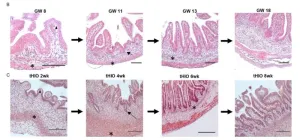(Press-News.org) Sophia Antipolis, 5 May 2023: Talking on a mobile for 30 minutes or more per week is linked with a 12% increased risk of high blood pressure compared with less than 30 minutes, according to research published today in European Heart Journal – Digital Health, a journal of the European Society of Cardiology (ESC).1
“It’s the number of minutes people spend talking on a mobile that matter for heart health, with more minutes meaning greater risk,” said study author Professor Xianhui Qin of Southern Medical University, Guangzhou, China. “Years of use or employing a hands-free set-up had no influence on the likelihood of developing high blood pressure. More studies are needed to confirm the findings.”
Almost three-quarters of the global population aged 10 and over own a mobile phone.2 Nearly 1.3 billion adults aged 30 to 79 years worldwide have high blood pressure (hypertension).3 Hypertension is a major risk factor for heart attack and stroke and a leading cause of premature death globally. Mobile phones emit low levels of radiofrequency energy, which has been linked with rises in blood pressure after short-term exposure. Results of previous studies on mobile phone use and blood pressure were inconsistent, potentially because they included calls, texts, gaming, and so on.
This study examined the relationship between making and receiving phone calls and new-onset hypertension. The study used data from the UK Biobank. A total of 212,046 adults aged 37 to 73 years without hypertension were included. Information on the use of a mobile phone to make and receive calls was collected through a self-reported touchscreen questionnaire at baseline, including years of use, hours per week, and using a hands-free device/speakerphone. Participants who used a mobile phone at least once a week to make or receive calls were defined as mobile phone users.
The researchers analysed the relationship between mobile phone usage and new-onset hypertension after adjusting for age, sex, body mass index, race, deprivation, family history of hypertension, education, smoking status, blood pressure, blood lipids, inflammation, blood glucose, kidney function and use of medications to lower cholesterol or blood glucose levels.
The average age of participants was 54 years, 62% were women and 88% were mobile phone users. During a median follow up of 12 years, 13,984 (7%) participants developed hypertension. Mobile phone users had a 7% higher risk of hypertension compared with non-users. Those who talked on their mobile for 30 minutes or more per week had a 12% greater likelihood of new-onset high blood pressure than participants who spent less than 30 minutes on phone calls. The results were similar for women and men.
Looking at the findings in more detail, compared to participants who spent less than 5 minutes per week making or receiving mobile phone calls, weekly usage time of 30-59 minutes, 1-3 hours, 4-6 hours and more than 6 hours was associated with an 8%, 13%, 16% and 25% raised risk of high blood pressure, respectively. Among mobile phone users, years of use and employing a hands-free device/speakerphone were not significantly related to the development of hypertension.
The researchers also examined the relationship between usage time (less than 30 minutes vs. 30 minutes or more) and new-onset hypertension according to whether participants had a low, intermediate or high genetic risk of developing hypertension. Genetic risk was determined using data in the UK Biobank. The analysis showed that the likelihood of developing high blood pressure was greatest in those with high genetic risk who spent at least 30 minutes a week talking on a mobile – they had a 33% higher likelihood of hypertension compared to those with low genetic risk who spent less than 30 minutes a week on the phone.
Professor Qin said: “Our findings suggest that talking on a mobile may not affect the risk of developing high blood pressure as long as weekly call time is kept below half an hour. More research is required to replicate the results, but until then it seems prudent to keep mobile phone calls to a minimum to preserve heart health.”
ENDS
Authors: ESC Press Office
Mobile: +33 (0)7 8531 2036
Email: press@escardio.org
Follow us on Twitter @ESCardioNews
Funding: The study was supported by the National Key Research and Development Program (2022YFC2009600, 2022YFC2009605), and the National Natural Science Foundation of China (81973133, 81730019).
Disclosures: The authors have no conflicts of interest to report.
References
1Ye Z, Zhang Y, Zhang Y, et al. Mobile phone calls, genetic susceptibility and new-onset hypertension: results from 212,046 UK Biobank participants. Eur Heart J Digit Health. 2023. doi:10.1093/ehjdh/ztad024.
Link will go live on publication:
https://academic.oup.com/ehjdh/article-lookup/doi/10.1093/ehjdh/ztad024
2International Telecommunication Union. Measuring digital development: facts and figures 2022. https://www.itu.int/hub/publication/d-ind-ict_mdd-2022/
3World Health Organization. Key facts on hypertension. https://www.who.int/news-room/fact-sheets/detail/hypertension.
About the European Society of Cardiology
The European Society of Cardiology brings together health care professionals from more than 150 countries, working to advance cardiovascular medicine and help people lead longer, healthier lives.
About European Heart Journal – Digital Health
European Heart Journal – Digital Health is the official digital health journal of the European Society of Cardiology. It covers the whole sphere of cardiovascular medicine, from all perspectives of digital health.
END
Mobile phone calls linked with increased risk of high blood pressure
2023-05-05
ELSE PRESS RELEASES FROM THIS DATE:
AI training: A backward cat pic is still a cat pic
2023-05-05
Genes make up only a small fraction of the human genome. Between them are wide sequences of DNA that direct cells when, where, and how much each gene should be used. These biological instruction manuals are known as regulatory motifs. If that sounds complex, well, it is.
The instructions for gene regulation are written in a complicated code, and scientists have turned to artificial intelligence to crack it. To learn the rules of DNA regulation, they’re using deep neural networks (DNNs), which excel at finding patterns in large datasets. DNNs are at the core of popular ...
Archaeologists map hidden NT landscape where first Australians lived more than 60,000 years ago
2023-05-05
Scientists at Flinders University have used sub-surface imaging and aerial surveys to see through floodplains in the Red Lily Lagoon area of West Arnhem Land in Northern Australia.
These ground-breaking methods showed how this important landscape in the Northern Territory was altered as sea levels rose about 8,000 years ago.
Their discovery shows that the ocean had reached this, now inland region, which has important implications for understanding the archaeological record of Madjedbebe—the oldest archaeological site in Australia.
The findings also provide a new way to understand ...
A special omega-3 fatty acid lipid will change how we look at the developing and ageing brain, Duke-NUS researchers find
2023-05-05
SINGAPORE, 5 May 2023 – Scientists from Singapore have demonstrated the critical role played by a special transporter protein in regulating the brain cells that ensure nerves are protected by coverings called myelin sheaths. The findings, reported by researchers at Duke-NUS Medical School and the National University of Singapore in the Journal of Clinical Investigation, could help to reduce the damaging impacts of ageing on the brain.
An insulating membrane encasing nerves, myelin sheaths facilitate the quick and effective conduction of electrical signals throughout the body’s nervous system. When the myelin sheath gets damaged, nerves may lose their ability ...
Similar but different: Antarctic and Arctic sea ice and their responses to climate change
2023-05-05
Results were published on March 29 in Ocean-Land-Atmosphere Research. Researchers used data from previous publications aiming to answer the question of why the Arctic sea ice is responding much more quickly and obviously than the Antarctic sea ice, which has stayed relatively stable according to the long-term studies monitoring the Antarctic region’s sea ice patterns.
“The differences in responses are explained in terms of geographic, climatic and
meteorological differences between the two regions. Arctic sea ice is located in the
polar area and encircled by land, while sea ice in the Antarctic ...
Study identifies messages about vaccinating children against COVID-19 that resonate best with vaccine-hesitant parents
2023-05-05
A study from Ann & Robert H. Lurie Children’s Hospital of Chicago found that parents with children who were not yet vaccinated against COVID-19 were most likely to vaccinate their child after reading the following hypothetical scenario:
You hear from other parents you trust that they have vaccinated their children against COVID-19. Some of them say that they weren’t sure at first about whether the vaccine is safe for kids. But they ended up deciding that it was the best way to fight COVID-19, and the vaccination went fine. ...
Organoids validated as tool for studying fetal intestine development
2023-05-04
Developmental biologists have learned a great deal about how the human digestive tract functions through many years of studies involving fish, frogs, and rodents along with detailed explorations of individual human cells. But nothing quite matches the learning that could be achieved from studying actual human organ systems as they form.
Yet for obvious reasons, running experiments on growing human fetuses is both unethical and illegal.
Now a study led by researchers at Cincinnati Children’s, published online April 18, 2023, in the journal Development, reports that lab-grown tissues called organoids accurately mimic key development stages of the human intestine.
“Achieving ...
New free-to-read collection shares research on the Southwest Asian and North African region
2023-05-04
Sage has launched a free-to-read collection of research and other resources that explore the Southwest Asian and North African (SWANA) region. Categories in the collection include:
gender role and oppression
governments, laws, and policies
information and media
mental health, healthcare, and medicine
protests, conflicts, and war
refugees, displaced, and stateless people
Readers can access the Southwest Asia and North Africa microsite free for a limited time. END ...
Cleveland Clinic Rare Disease Center recognized as a National Center of Excellence by National Organization for Rare Disorders
2023-05-04
May 4, 2023, Cleveland: Cleveland Clinic has been designated a Rare Disease Center of Excellence by the National Organization for Rare Disorders (NORD). The new Cleveland Clinic Center for Rare Diseases is one of 40 U.S. academic medical centers selected to join the first-of-it-kind national network dedicated to diagnosing, treating and researching all rare diseases.
The NORD Rare Disease Centers of Excellence program provides a much-needed national infrastructure to help accelerate advancements for rare diseases. The network of medical institutions, led by NORD, is designed to improve rare disease patient care by connecting patients to appropriate specialists regardless of disease ...
Adding epigenetic drug to standard chemotherapy was effective in pilot study for T-cell lymphoma
2023-05-04
Nearly 90 percent of patients with an aggressive subtype of non-Hodgkin lymphoma had their cancer go into remission in a small phase 2 clinical trial testing a treatment aimed at making chemotherapy more effective, according to Weill Cornell Medicine and NewYork-Presbyterian investigators.
The clinical trial, whose results were published May 4 in Blood, included 17 patients with a type of blood cancer called peripheral T-cell lymphoma with T-follicular helper phenotype (PTCL-TFH), also known as angioimmunoblastic T-cell lymphoma. Fifteen of them (88.2 percent) had complete ...
What really killed COVID-19 patients: it wasn’t a cytokine storm
2023-05-04
· No evidence of cytokine storm in critically ill patients with COVID-19
· Nearly half of patients with COVID-19 develop a secondary bacterial pneumonia
· Crucial to find and aggressively treat secondary bacterial pneumonia in ICU patients
CHICAGO --- Secondary bacterial infection of the lung (pneumonia) was extremely common in patients with COVID-19, affecting almost half the patients who required support from mechanical ventilation. By applying machine learning to medical record data, scientists at Northwestern University Feinberg School of Medicine found that secondary bacterial pneumonia that does not resolve was a key ...



